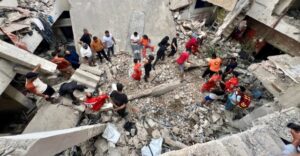Israel is entering Lebanon with its forces conducting quiet raids in the south of the country, using Hezbollah’s sophisticated network of underground tunnels to launch a ground assault on the terrorist group’s remaining strongholds.
The quiet raids by Tel Aviv, first revealed by the Wall Street Journal, are part of a broader effort by the Netanyahu government to “bring Hezbollah to its knees.” Meanwhile, the ground offensive is underway, Israeli Defense Minister Yoav Galad said a few hours ago.
For his part, outgoing US President Joe Biden expressed his disappointment, stating that “he would feel comfortable if Israel would stop hostilities.”
“The elimination of Hezbollah leader Hassan Nasrallah is an important step, but it is not the final step. We will use all the capabilities at our disposal,” the Israeli minister said, addressing “infantry and tank brigades” located near the Lebanese border.
“We will use all the means required – our forces, everything we have, by air, sea and land.” Israeli special forces are reportedly using “targeted” raids to gather intelligence as they prepare for the full assault, which will aim to destroy the Radwan unit of Hezbollah’s special forces along Israel’s northern border.
Why Israel chose the underground tunnels
The Shiite group’s underground tunnel system from Lebanon is critical for moving fighters and transporting weapons close to Israeli territory. By dismantling these networks, Israel is preparing its troops to clear out any remaining Hezbollah outposts that pose a threat to the Jewish state’s northern communities.
More than 50,000 Israelis have been forced to flee their homes since Hezbollah began firing rockets and drones into towns along the northern border after October 7.
For Richard Goldberg, a former White House National Security Council member and regional analyst, “getting rid of the tunnel infrastructure, cleaning up the missile stockpile, and making sure no one sees the Hezbollah flag out their window again is the only way to convince people to return to their homes.”
“We are ready for a ground engagement with the enemy”
Nassim Qassem, the second leader of Hezbollah and de facto leader of the terror group since the assassination of Hassan Nasrallah on Friday, told reporters yesterday of Israel’s impending ground invasion: “We are ready for a ground engagement with the enemy if they decide to enter.”
Also, Kassem has stressed in recent days that “there will be surprises for Israel in the coming battles.”
Iran, the “guardian angel” of Hezbollah, has already promised to support the Lebanese group in all future campaigns against Israel. However, it remains unclear how far Tehran is willing to go, with the hardline government sending mixed messages in the days after Nasrallah’s assassination.
“We will show Israel’s defeat to the international community”
“Wait,” the Iranian general, Abdallrahim Mousavi, said yesterday, discussing Iran’s response to Nasrallah’s assassination.
In separate remarks over the weekend, the head of Tehran’s government intelligence council stressed that his country is ready to “use all its capabilities to help Hezbollah and the people of Livan.”
“Hezbollah has not used its weapons and must start now,” said Evliyah Hazrati, a senior Iranian government official. “We will show the defeat of Israel to the international community.”
He appealed to civilians to evacuate nearly a dozen Lebanese border communities hours after what he said was the start of a limited ground invasion against Hezbollah.
The Lebanese Shiite group denied that Israeli troops had entered its territory but stressed it was ready to fight them.
The army advised civilians to move north of the Awali River, about 60 kilometers from the border and well beyond the Litani River, which marks the northern edge of a zone declared by the United Nations as a dividing line between Israel and Hezbollah after the 2006 war.
“You must immediately head north of the Awali River to save yourselves and leave your homes immediately,” said the statement posted by Israeli army Arab spokesman Avichay Adraee on the X platform.
Israel’s warning suggests a deeper push in Lebanon. The border region has been largely emptied over the past year as the war raged.
However, the scope of the evacuation warning raises questions about how deep Israel will push in, sending its forces into Lebanon, as it embarks on a rapidly escalating campaign against Hezbollah.
In his first statement since Israel announced the start of clearing Hezbollah areas, Lebanese Prime Minister Najib Mikati, said Israel was violating Lebanon’s sovereignty and risking a second war in the north of the Jewish state.
Lebanon accuses Jerusalem of trying to take over the southern part of its territory and of interfering in its internal affairs.
Ask me anything
Explore related questions





